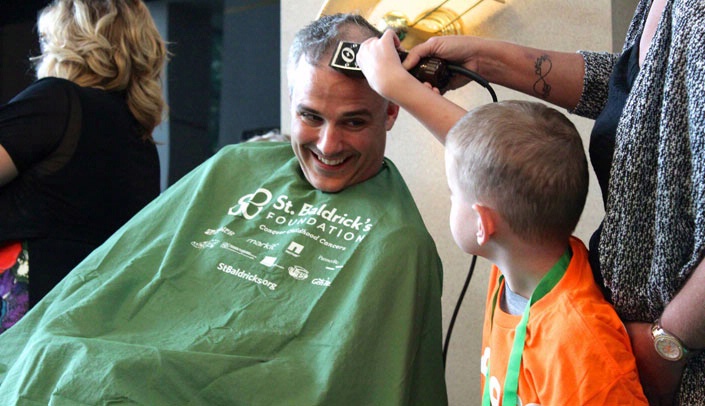In a lifetime, an average person loses 40-100 hairs each day — so why not give it all up temporarily in the name of cancer research?
That’s the message from the St. Baldrick’s Foundation, the country’s largest volunteer-supported fundraiser for pediatric cancer research.
About the event
What: St. Baldrick’s 2016 Head Shaving Event at Nebraska Medicine
When: 2 p.m. Friday
Where: Durham Outpatient Center West Atrium, 4400 Emile St.
For the 9th year, a dedicated group of physicians, nurses and staff members from Nebraska Medicine and UNMC are answering that call and joining the St. Baldrick’s mission. Through the support of individual sponsors, each volunteer “shavee” collects money for the foundation. In exchange, they shed their hair to show solidarity with patients who’ve lost their hair during cancer treatment.
“It’s hard enough for kids with cancer to deal with being sick, let alone looking sick too, without their hair,” said Mandy Arens, pediatric oncology nurse practitioner at Nebraska Medicine. “Now these staff members will sport the same ‘do’ to show support for how their young patients are feeling.”
To date, Nebraska Medicine has raised more than $57,000 to support the St. Baldrick’s Foundation and fund pediatric cancer research. Last year’s head shaving event raised $7,500. This year, one of the female shavees (Jordan) is back for her third time and already has raised more than $5,000. Per tradition, pediatric oncologists Don Coulter, M.D., associate professor of pediatrics hematology/oncology, and Bruce Gordon, M.D., professor of pediatrics hematology/oncology, will kick off the Friday event.
“The barbers will get some extra help from our little heroes who are currently battling pediatric cancer,” Arens said. “The kids are excited to shave their doctors’ heads!”
Dr. Coulter, who completed his fellowship at the University of North Carolina, is one of the first St. Baldrick’s Fellows, who trained to specialize in pediatric oncology research. Dr. Coulter continues to be successful and active in pediatric cancer research, with a specific focus on neuroblastoma, a type of cancer in children that typically occurs along the spine or in the adrenal gland on top of the kidney.
Childhood cancer takes the lives of more U.S. children than any other disease — more than AIDS, asthma, diabetes, cystic fibrosis and congenital anomalies combined. Despite that, national funding for childhood cancer research has slipped in recent years, and events like this head-shaving challenge will help raise money and start conversations.
If you’re interested in participating or donating to this event, contact Arens at amarens@nebraskamed.com or click here.
